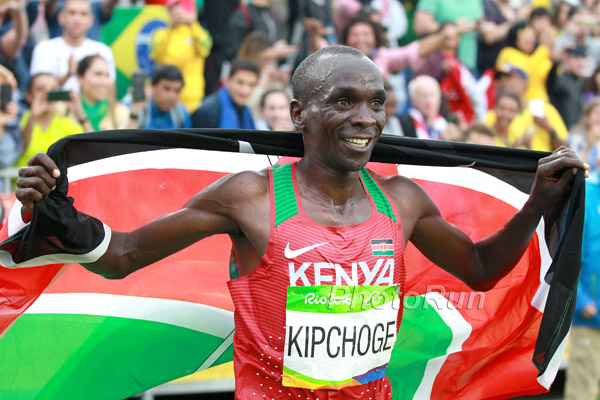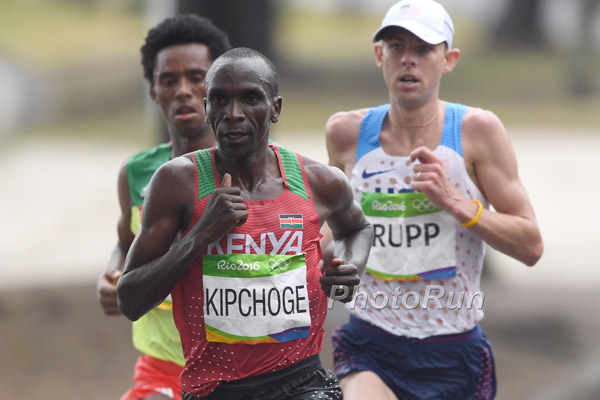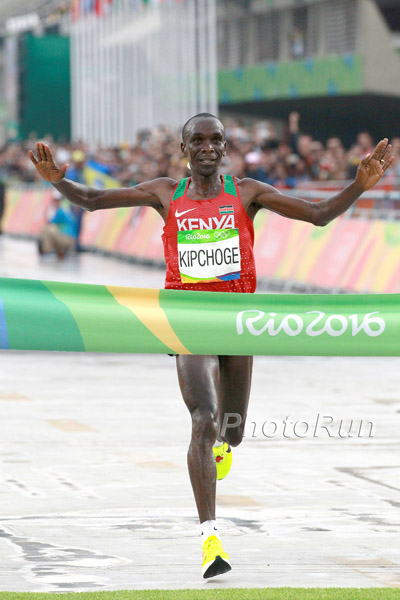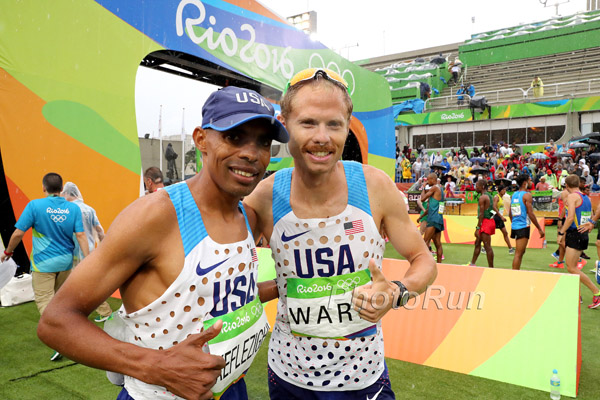2016 Olympic Marathon - Men
By John Elliott

photo: Victah Sailer/PhotoRun |
The Favorite
When the man who had run the second-fastest marathon of all-time is in a race, he must be one of the favorites. When that second-fastest marathon was that runner's last race and was four months before the current race: we also know that man must be in shape. And with that, most knew that Eliud Kipchoge of Kenya was and would be the favorite to take home the Gold Medal for the Marathon at the 2016 Rio Olympic games. Kipchoge was the winner of the 2016 London Marathon in 2:03:05 in April. Kipchoge had run seven marathons in his life, all but one having been run faster than 2:05 (his first marathon, the 2013 Hamburg Marathon was "only" won in 2:05:30). To compete against Kipchoge were only a few legitimate contenders... three Ethiopians who had each run sub-2:05 once: Tesfaye Abera, Lemi Berhanu and Feyisa Lilesa; and Kipchoge's teammate, Stanley Biwott who ran 2:03:51 to take second behind Kipchoge (46 seconds back) at the 2016 London Marathon. By anyone's standards, Kipchoge was the man to beat - both as the man with the best prior performances and incredible consistency.

photo: Victah Sailer/PhotoRun |
On Pace to 2:11/2:12
As we keep mentioning, the Olympic Marathon is not about running a fast time. For the best, it is simply about earning one of the top three spots and one of the Olympic medals: Gold, Silver or Bronze. For the rest, it's about participating with the best in the world and being an Olympian (and perhaps getting some TV time). With that in mind, the marathon started slowly: the first 17 miles were run at a pace toward a 2:11/2:12 marathon - a very easy pace for the best and something manageable for the rest. Through the first 5K and 10K, about 70 of the 155 starters still ran together. In fact, only 34 men in the field had ever run better than 2:11 (and only 13 within the past year), so this was not a pace all could maintain - but at 10K the pace was something with which this large group could be comfortable with and bask in the glory of the Olympics.
The pace stayed relatively consistent, as the 5K marks were hit at paces between 15:31 and 15:45, in order through 25K: 15:31, 15:37, 15:45, 15:34, 15:45. At a cumulative total of 1:18:12 through 25K, the average pace would set the runners to the finish at 2:11:59. At that pace and at 25K, there were still 35 men running together. Of those with the fastest times, just one had dropped out: Tesfaye Abera did not make it to the 25K mark.
The Real Race Begins...
Following the 16th mile of the race, the pace quickened. Teammates Eliud Kipchoge and Stanley Biwott seemed to be talking about how to control the race and between them initiated the increase in pace. Quickly the lead pack dropped to thirteen men, then eleven and by 30K (with a 5K split of 15:03) the pack was down to nine men as the pace was now suggesting at least a marathon finishing time sub-2:11. Among the nine were three Kenyans: Kipchoge, Biwott and Wesley Korir; the two remaining Ethiopians: Lemi Berhanu and Feyisa Lilesa; a naturalized Swiss runner: Tadesse Abraham; a Turkish runner: Kaan Kigen Ozbilen; a Ugandan runner: Munyo Solomon Mutai; and one American: Galen Rupp.
Soon after the 30K, the pace quickened again and the Turkish and Swiss runners were the first to fall out to leave a pack of 7 who would clearly contain the medalists. Lemi Berhanu briefly took the lead as it appeared that Biwott and Rupp were strugglng and at risk. But within another mile Korir and Mutai were off the back and Rupp was looking more comfortable in the pack.

photo: Victah Sailer/PhotoRun |
30K to 35K
The 5K between 30K and 35K was traversed in 14:25. For those who prefer talking about miles, that is an average pace of 4:39/mile - and if a whole marathon were run at that pace, it would results in a 2:01:40 marathon. That is fast. Kipchoge was setting the pace and only two men could run with him at that seed, and the race was down to only three: Kipchoge, Feyisa Lilesa and Galen Rupp. Of the three, Kipchoge and Lilesa were seasoned veterans; while Rupp was in uncharted territory now running in only his second marathon and already running faster than his only previous outing at 26.2 miles. Behind the three who ran the 14:25 5K split, the next runners had lost 47 seconds on the leaders in the that 5K section... Berhanu, Mutai and Biwott were now well behind having run 15:12 for their 5K.

photo: Victah Sailer/PhotoRun |
To The Finish
Rupp seemed to struggle for a bit as Lilesa and Kipchoge continued on pace. At one point, Lilesa seemed to jostle Kipchoge and Kipchoge appeared annoyed and then simply ran away from his competition. Kipchoge ran the 5K from 35K to 40K in 14:44. Lilesa ran his in 15:19, while Rupp could manage 15:31. It was clear that Kipchoge would be champion running toward a sub-2:09 finish. It was clear that Lilesa would earn the Silver medal. Rupp seemed to be slowing and behind him Ghirmay Ghebreslassie of Eritrea was making up ground and ran the second fastest split of anyone from 35K to 40K: 15:18... But a minute behind Rupp, it nevertheless seemed unlikely that Ghebreslassie could catch the American.
Even with his commanding lead, Kipchoge did not slow and clocked the fastest final 2.2K split of all competitors - 6:20 - to extend his lead and win in 2:08:44, the third fastest winning time at any Olympics - behind Sammy Wanjiru's Olympic record in Beijing 2008 of 2:06:32 and behind Stephen Kiprotich's winning time of 2:08:01 at the London Olympics in 2012. The next runners maintained their paces and little changed as far as positioning among the medal contenders. At the end as Feyisa Lilesa took the Silver medal more than a minute back in 2:09:54. Galen Rupp - in only his second marathon - took the bronze medal in a personal best time of 2:10:05.

photo: Victah Sailer/PhotoRun |
Americans - Passing the Torch
Since 2004, Meb Keflezighi has been the standard bearer for American men's marathoning. Keflezighi took the Silver medal at the 2004 Olympics and then continued his long marathoning career by extending his legacy with wins at the 20090 New York City Marathon and 2014 Boston Marathon not to mention other numerous top 5 finishes including a fourth place finish at the 2012 Olympics. Now 41, Keflezighi nears retirement from running with just one more swan-song marathon planned. Keflezighi's 33rd place finish at this Olympics did not remind us of the Keflezighi we have seen, but served as a well-earned victory lap.
Beyond Keflezighi, the past dozen years of American marathoning had been dominated by Ryan Hall, Dathan Ritzenhein and Abdi Abdirahman - none of whom made it to the 2016 Olympics. But with the performances at the 2016 Olympics, we now see the ascendance of Galen Rupp who earned the Silver medal at the 10,000m in the 2012 Olympics (not to mention his 5th place finish at 10,000m in these Olympics) and at 30 years old he seems to be a deserving leader to bring American marathoning into the next decade.
And Jared Ward... We may also point out how impressive Jared Ward's run was at these Olympics and the further expectations for Ward. Ward was the surprise third place finisher at the Olympic Trials and little was expected of him other than to be an Olympian. But in Rio, Ward ran through to an impressive sixth place finish in a personal best of 2:11:30. In the final 2.2K, Ward's 6:31 split was faster than any other runner other than the winner, Kipchoge; and in that final mile and a half, Ward passed three runners to finish sixth. Ward's run was truly impressive and suggests there may be even more in the future for the 27 year old runner. The torch has been passed.
|









